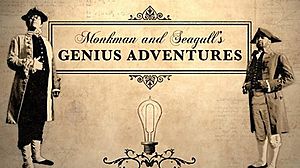- This page was last modified on 12 June 2025, at 22:18. Suggest an edit.
Monkman & Seagull's Genius Adventures facts for kids
| Monkman & Seagull's Genius Adventures | |
|---|---|
 |
|
| Genre | Road trip |
| Directed by | Joseph Cunningham |
| Presented by | Bobby Seagull, Eric Monkman |
| Country of origin | United Kingdom |
| No. of seasons | 1 |
| No. of episodes | 3 |
| Production | |
| Executive producer(s) | Simon Dickson, Lorraine Charker-Phillips |
| Producer(s) | Joseph Cunningham |
| Production company(s) | Label1 Television Ltd |
| Release | |
| Original network | BBC 2 |
| Original release | 18 May – 1 June 2020 |
| Chronology | |
| Related shows | |
Monkman & Seagull's Genius Adventures is a fun BBC TV show. It stars Eric Monkman and Bobby Seagull. They first met as rivals on a quiz show called University Challenge. But they became great friends and now host TV and radio shows together!
This series is a follow-up to their 2018 show, Monkman & Seagull's Genius Guide to Britain. In this adventure, they go on a road trip across the United Kingdom. They travel back in time to explore 150 years of amazing discoveries. This period goes from the Industrial Revolution to the Victorian era. The show first aired in 2020. The narrator's voice was provided by Simon Callow.
Contents
Exploring Brilliant Discoveries
Monkman and Seagull visit places where big ideas changed the world. They explore how people invented new machines and made scientific breakthroughs. These inventions helped shape the modern world we live in today.
Episode 1: The Start of Big Changes
The first episode dives into the early Industrial Revolution. This was a time of huge changes in how things were made. It also covers the Age of Enlightenment. This was a period when new ideas about science and reason became very popular.
- 1759 - Accurate Clocks for Sailors: They learn about John Harrison's marine chronometer. This special clock helped sailors find their exact position at sea.
- 1768 - The First Encyclopedia: The first edition of the Encyclopædia Britannica was published. This huge book aimed to share all human knowledge.
- 1769 - New Ways to Spin Cotton: Richard Arkwright invented the water frame. This machine used water power to spin cotton much faster.
- 1769 - Better Steam Engines: James Watt improved the steam engine. His new design used less fuel.
- 1774 - Weighing the Earth: The Schiehallion experiment tried to weigh the entire planet Earth!
- 1774 - Discovering New Gases: Joseph Priestley did amazing experiments on gases. He discovered oxygen and other important gases.
- 1784 - Hot Air Balloons Take Off: People started flying in hot air balloons. This was a thrilling new way to travel!
- 1801 - The First Steam Train: The Puffing Devil was the world's first steam railway engine. It was designed by Richard Trevithick.
Episode 2: Building Britain's Future
This episode looks at the first half of the 19th century. It shows how Britain built its industrial backbone. This included new ways to travel and communicate.
- 1815 - Safer Mining Lamps: The Davy lamp was invented. This lamp made coal mines much safer for workers.
- 1821 - Understanding Electricity: Michael Faraday did important research on electricity. His work helped us understand how electricity works.
- 1824 - Stronger Building Material: Portland cement was invented. This new type of cement made buildings much stronger.
- 1829 - The Famous Rocket: Stephenson's Rocket was a super-fast steam locomotive. It won a famous race called the Rainhill Trials.
- The History of Bicycles: They explore how bicycles developed over time.
- 1846 - Early Computers: Charles Babbage designed his Difference Engine No 2. This was an early mechanical computer.
- 1843 - A Giant Ship: The SS Great Britain was a huge ship. It was one of the most advanced ships of its time.
Episode 3: The Peak of the Victorian Era
The final episode explores the height of the Victorian Era. This was a time of great progress and new ideas.
- 1854 - Dinosaur Park: The Crystal Palace Dinosaurs were built. This was the first public park dedicated to science.
- 1855 - Fern Fever: People became obsessed with collecting ferns. This was known as the Victorian fern-hunting craze.
- 1858 - Cleaning Up London: The Crossness Pumping Station was built. It was a key part of the new London sewerage system. This helped make the city much cleaner.
- 1859 - Evolution Explained: Charles Darwin wrote On The Origin Of Species. This book changed how people thought about life on Earth.
- 1870 - Connecting the World: An undersea telegraph line connected Britain to India. This made communication much faster.
- 1881 - Electric Lights: The Savoy Theatre became the first public building lit entirely by electricity.
- 1897 - Discovering Tiny Particles: The electron was discovered. This tiny particle is a basic part of all atoms.
